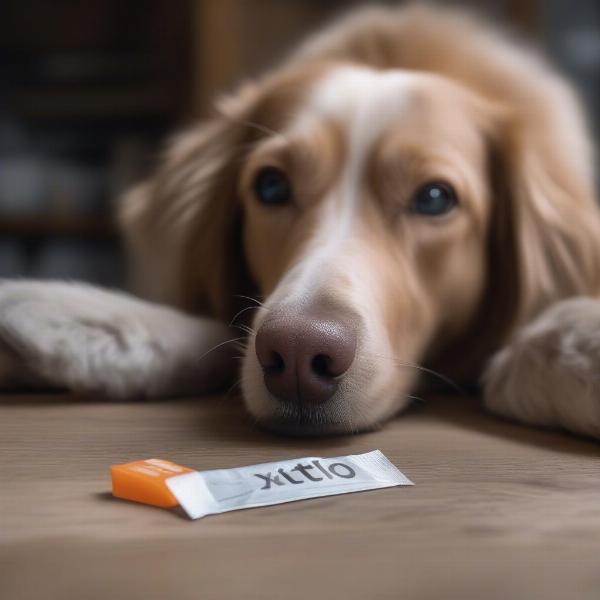Chewing gum is a common household item, but its sweet scent and chewy texture can be tempting for our canine companions. So, is gum harmful to dogs? The short answer is: it depends. While some gums are relatively harmless, others can pose serious health risks. Understanding the potential dangers and knowing what to do if your dog ingests gum is crucial for responsible pet ownership.
The Dangers of Xylitol in Gum
The primary concern with dogs and gum is the artificial sweetener xylitol. Xylitol is extremely toxic to dogs, even in small amounts. It causes a rapid release of insulin, leading to a dangerous drop in blood sugar (hypoglycemia). Symptoms of xylitol poisoning can appear within 15-30 minutes and include weakness, vomiting, loss of coordination, seizures, and even liver failure.  Dog looking at xylitol gum
Dog looking at xylitol gum
If you suspect your dog has ingested gum containing xylitol, contact your veterinarian or an animal poison control center immediately. Time is of the essence in treating xylitol poisoning.
Sugar-free gum is the most likely culprit when it comes to xylitol, but it’s crucial to check the ingredients of any gum your dog might encounter. Xylitol is also found in many other products, such as sugar-free candies, baked goods, toothpaste, and some medications.
Other Gum-Related Risks for Dogs
Even if a gum doesn’t contain xylitol, it can still pose risks to dogs. The gum itself can be a choking hazard, especially for small breeds. The sticky texture of gum can also cause intestinal blockage, particularly if the dog swallows a large amount. While this is less common than xylitol poisoning, it can still require veterinary intervention.
Furthermore, some gums contain other artificial sweeteners that may not be as toxic as xylitol but can still cause digestive upset in dogs, such as diarrhea and vomiting.
What to Do If Your Dog Eats Gum
If your dog eats gum, the first step is to identify the type of gum and check the ingredients. If it contains xylitol, seek immediate veterinary care. Even if the gum is sugar-free but doesn’t list xylitol, it’s still best to err on the side of caution and contact your veterinarian for advice.
For gums that don’t contain xylitol or other artificial sweeteners, monitor your dog closely for any signs of distress, such as vomiting, diarrhea, lethargy, or difficulty breathing. If your dog exhibits any of these symptoms, consult your veterinarian.
Preventing Gum Ingestion
The best way to protect your dog from the dangers of gum is to prevent them from accessing it in the first place. Store gum and other potentially harmful substances out of reach, in closed cabinets or drawers. Be mindful of discarded gum wrappers and dispose of them properly.
Encourage healthy chewing habits by providing your dog with appropriate chew toys. This can help redirect their chewing instincts and prevent them from seeking out inappropriate items like gum. my dog ate chewing gum off the floor
Conclusion
While the occasional piece of sugar-free gum without xylitol may not cause significant harm, it’s best to avoid giving your dog any type of gum. Xylitol is a serious toxin, and even small amounts can be life-threatening. Be vigilant about keeping gum and other potentially harmful substances away from your dog, and if you suspect your dog has ingested xylitol, seek immediate veterinary attention. antiseptic for dogs mouth
FAQ
- What are the signs of xylitol poisoning in dogs? Weakness, vomiting, loss of coordination, seizures, and liver failure.
- Is all sugar-free gum toxic to dogs? No, but many sugar-free gums contain xylitol, which is extremely toxic.
- What should I do if my dog eats gum with xylitol? Contact your veterinarian or animal poison control center immediately.
- Can gum cause intestinal blockage in dogs? Yes, especially if the dog swallows a large amount.
- How can I prevent my dog from eating gum? Store gum out of reach and provide appropriate chew toys. pictures of dogs with gum disease
- Are there safe alternatives to gum for dogs to chew on? Yes, there are many dog-specific chew toys available. chew bone for dogs
- What other household items are dangerous for dogs? Chocolate, grapes, raisins, onions, and certain medications. no ice water for dogs please read asap
ILM Dog is your trusted resource for expert advice on all aspects of dog care, from breed selection and health to training, nutrition, and grooming. We connect dog owners worldwide with practical, reliable information to ensure their furry companions live long, healthy, and happy lives. Whether you’re a seasoned dog owner or just starting your journey, ILM Dog provides the tools and resources you need. Contact us today for personalized advice! Email: [email protected], Phone: +44 20-3965-8624.